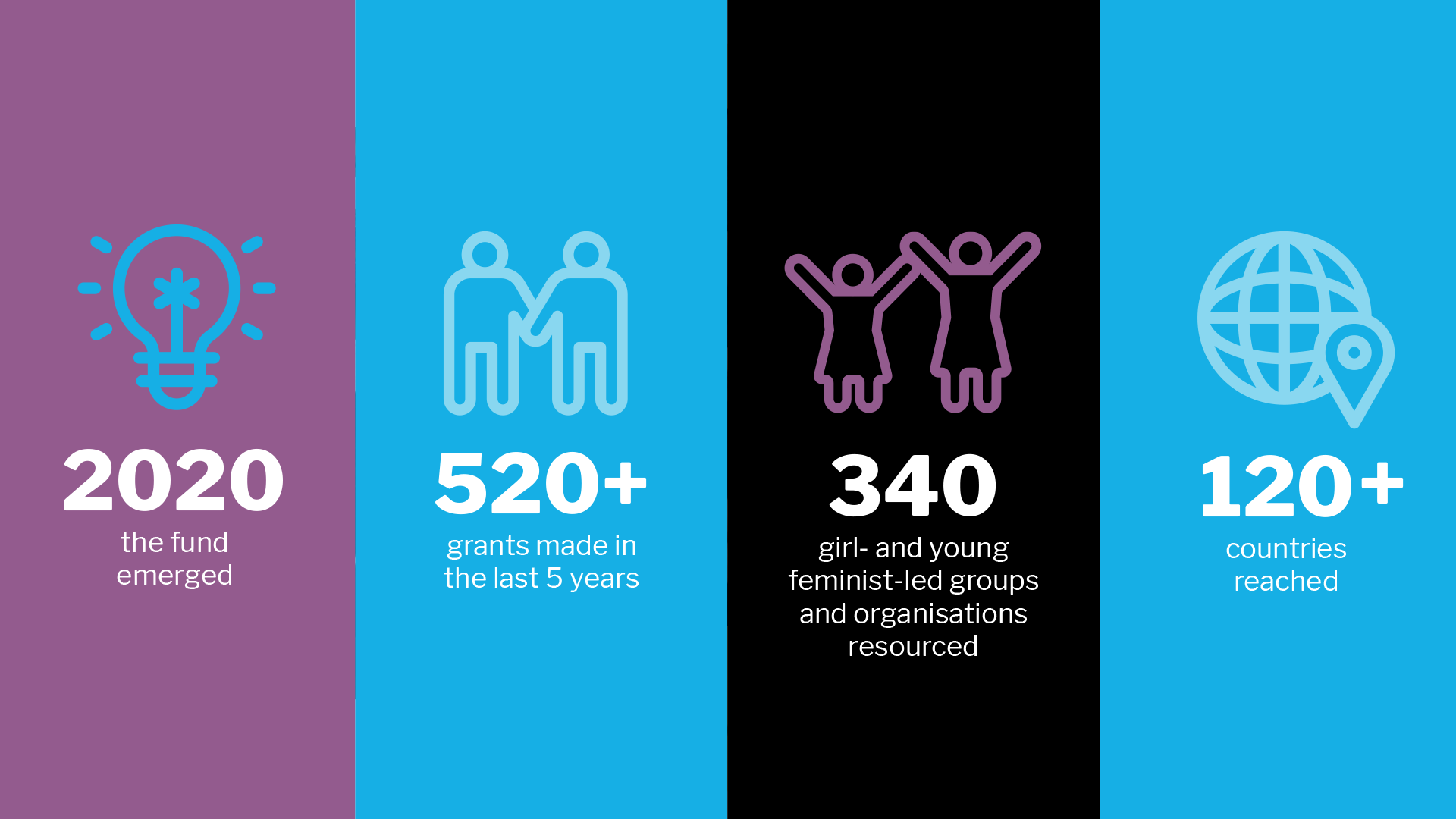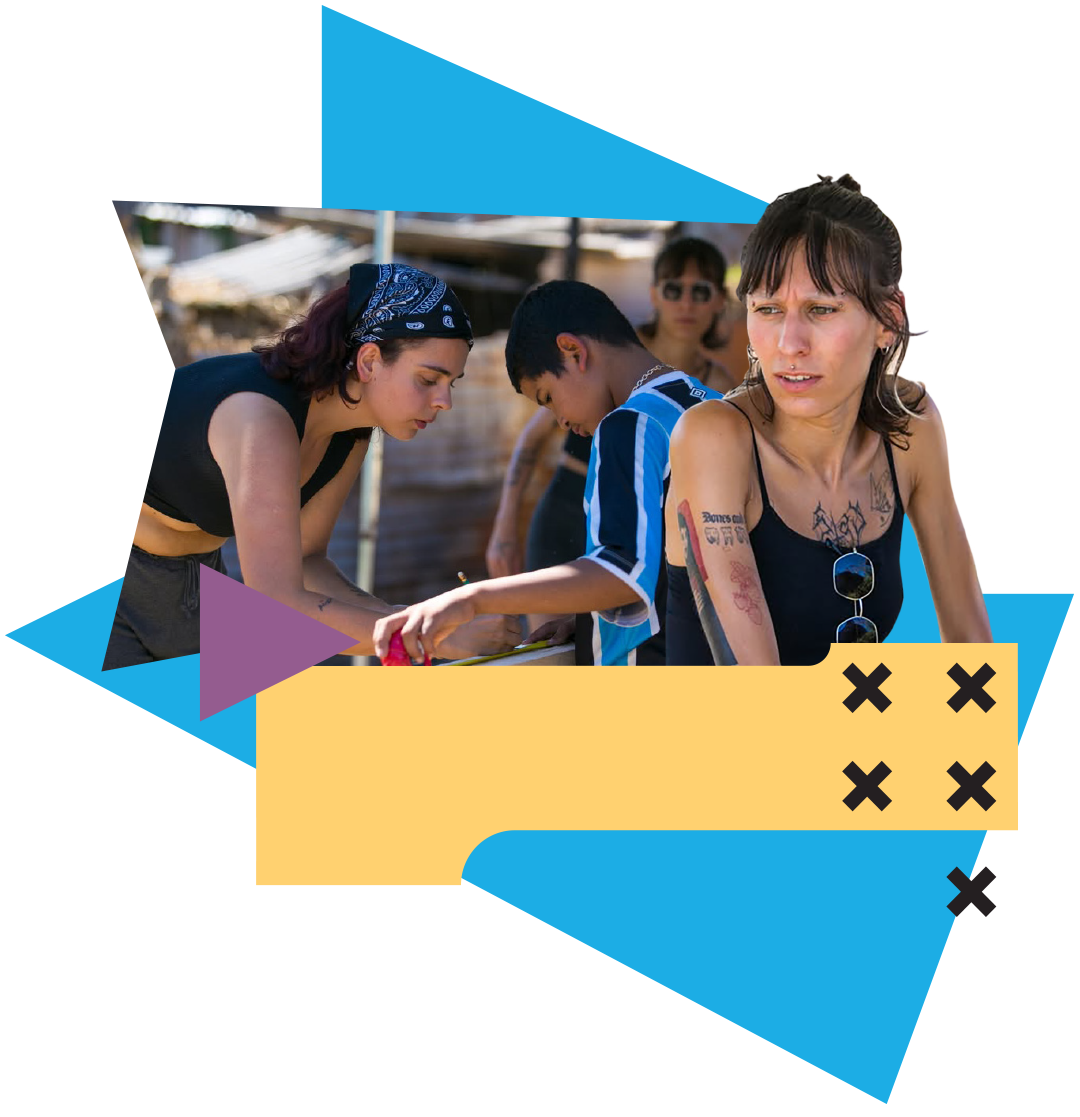
A LOOK AT IMPACT IN THE LAST 5 YEARS
From uncertainty, new possibilities and bold action can be born
Launched five years ago in urgent response to the compounding crises of the COVID-19 pandemic, the Global Resilience Fund emerged as a bold act of collective solidarity. It brought together more than 20 courageous funders and individual champions to resource girls and young people responding on the frontlines of crisis and humanitarian disaster.
The GRF was sparked and continues to be housed by Purposeful as a deliberate political choice. This is not incidental; it reflects a deep commitment to underwriting risk, absorbing core costs, and building the infrastructure needed to move money in effective ways. In a world on fire, GRF is not just a funding mechanism; it is a living expression of our collective refusal to let girls and young people be excluded from humanitarian response, and of Purposeful’s strategy to resource resistance and resilience at the margins, with urgency and care.
Sitting in community and complementarity with women and feminist funds, such as the Urgent Action Sister Funds, part of the First Responders Fund and many others, we are collectively demonstrating that feminist grantmaking is not only effective and scalable—it is able to reach and fund local communities directly on the margins.
Our approach as an adaptive field-level mechanism:
Move more flexible, rapid, and long-term resources for and with girls and young feminists who are on the frontlines of crisis response and recovery.
Document and amplify the critical work of girls and young feminists responding to crises to ensure their work is more visible and recognised.
Organising and advocacy: Strengthen the funding ecosystem of crisis response for girls and young feminists, deepening accountability and collaborations with diverse funders.
Our response is shaped by the leadership of girls and young feminists who are both directly affected by crises and leading response in their communities. Through our collective efforts, girls and young feminists impacted by and responding to acute and protracted crises, from wars and armed conflict to climate crises and earthquakes, have flexible funding to support their leadership and response. We centre their strategies and advocate for attention to globally ignored and under-resourced crises, working to strengthen collaboration, reduce duplication, and unlock new resources.
GRF in numbers

Types of crises we have funded in the last 5 years
Humanitarian crises (refugee and displacement crises, food insecurity)
Economic Crises (financial crises, economic inequality)
Environmental Crises (climate crises, natural resources crises, biodiversity loss)
Armed conflict (international armed conflict, civil war)
Health crises (pandemics)
Social crises (civil unrest, gender and sexual discrimination, gender-based violence, closure of civic space)
Political Crises (government instability, authoritarianism, military coups)
A closer look at the last 12 months
From March to April 2025, we reached out to current grantees via survey or one-to-one learning calls to understand reach, impact, and success from their perspective. The data below paints a robust picture of the power of resourcing organisations directly in times of crisis.
Who are our partners reaching?
Impact / change
WHAT CHANGE LOOKS LIKE
The Global Resilience Fund has supported girl- and young feminist-led organisations and groups around the world that have been active in different crisis contexts.
Some of the key meaningful contributions to change include:
Providing direct humanitarian aid, including food, water and sanitation, and reaching vulnerable people shut out of accessing services and/or supplies
Facilitating informal safe spaces in crisis, supporting survivors of violence and building rapid psychosocial support systems and networks of care
Documenting atrocities of war, through citizen journalism, rapid participatory action research, and creative arts based methodologies
Demanding accountability for their communities, advocating with and for girls impacted by violence, and holding the line on hard won human rights gains.
One of the most valuable parts was realising the importance of having a guarantee of basic assistance, essential for existence, such as food, hygiene products, water and clothing. Mutual support and collective work showed the strength it has, generating countless moments of sharing, affection and power. Understanding that solidarity, articulation and organisation of us women are fundamental to our existence, because in times like these, if it weren’t for the care, affection and us being together, helping each other, many would not have survived.
—Ocupação Vila Resistência, Brazil
As groups reflect on the changes their work catalyses in their communities over the last year, it is more evident than ever that their activities are essential, responding to the complex needs of the populations they’re reaching and the many dimensions of times of crisis. In addition to supporting communities to meet their basic needs, including access to water, food, menstrual products and shelter, groups have a profound awareness of the likelihood of increased violence during emergencies.
Two out of three groups are ensuring that survivors of violence have access to frontline services and support, while one in two groups share that their activities are reducing the risk of violence to the populations they work with.
Groups are also supporting communities’ abilities to recover by protecting their livelihoods and access to education; furthermore, beyond the response, they’re creating networks of solidarity and support.
50 women-led small businesses were given financial support to help them restock and restart operations after experiencing loss or damage during the protests and unrest. Emergency support (food, medical aid, economic assistance) helped the most vulnerable families stabilise and begin to rebuild, especially those who had lost breadwinners or had their businesses destroyed. 24 people who were injured during protests were provided with hospital care, medication, and follow-up treatment. Additionally, 35 women received trauma counselling to support their mental health and healing process.
—Ocupação Vila Resistência, Brazil
Photos this page from grantee partners Las Niñas Lideran from Guatemala, Vila Resistencia from Brazil and Basmat Amal from Palestine (Gaza).






